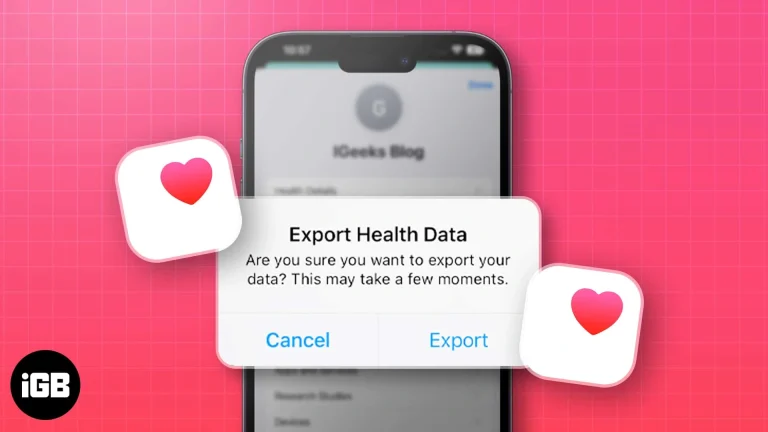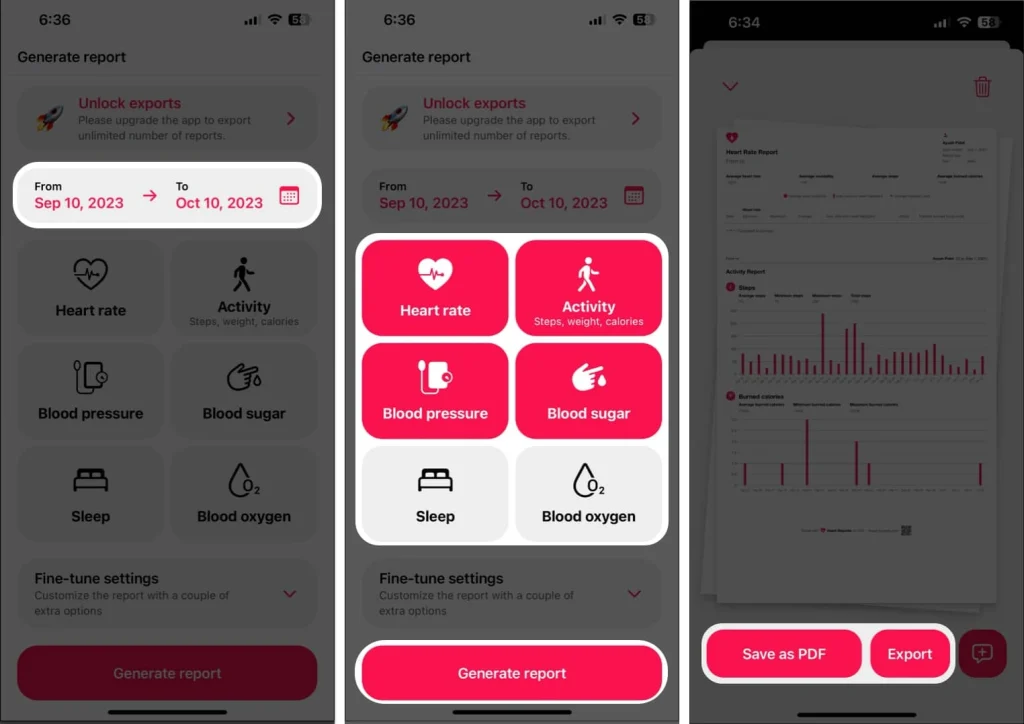If you’ve ever wondered how to export health data from iPhone, you’re not alone. As more people track their daily steps, sleep patterns, and workouts, owning that data has become an essential part of personal wellness. Apple’s Health app stores years of valuable insights from heart rate to mindfulness sessions yet many users don’t realize they can safely back it up, analyze it, or transfer it to other devices.
Exporting your iPhone health data lets you keep full control of your information, whether you’re changing phones, comparing fitness progress, or sharing reports with a doctor. This guide walks you through the complete process from understanding Apple Health and its data formats to ensuring privacy and secure backups all written for real users, not just tech experts.
You can also checker our guide aboout: How to Fix iPhone Apps Freezing After the iOS 18 Update
Why Exporting You’r iPhone Health Data Matters
Your iPhone’s Health app acts as a digital diary for your body. Every step you take, every heartbeat recorded by your Apple Watch, and every night’s sleep contributes to a bigger picture of your wellbeing.
Exporting this data means taking ownership of that information. Perhaps you’re starting a new fitness plan and want to track trends in Excel. Maybe you’re switching to Android and need your workout history. Or you might just want a secure backup in case your phone is lost or reset.
Beyond convenience, there’s also a growing awareness of data privacy. Keeping a personal copy of your health metrics gives you freedom to decide where and how your information is stored, analyzed, or shared.
Understanding Apple Health and Health Kit Data
To export data effectively, it helps to understand where it lives. Apple’s Health app is powered by Health Kit, a framework that collects and organizes health data from your iPhone, Apple Watch, and connected fitness or nutrition apps.
This data includes metrics like:
- Steps and distance
- Heart rate and resting heart rate
- Sleep duration and quality
- Workouts and calories burned
- Mindfulness or breathing sessions
Each of these data points is stored locally on your device, encrypted by default, and optionally synced with iCloud. When you export the data, Apple packages it into an XML file, a flexible format that can store thousands of health records securely and in structured form.
Step-by-Step Guide: How to Export Health Data from iPhone
Exporting your Apple Health data is straightforward once you know where to look. Follow these steps carefully to create a complete backup of your health information.
- Open the Health app on your iPhone.
- Tap your profile icon in the top right corner.
- Scroll down and select Export All Health Data.
- Confirm when prompted.
- Your iPhone will begin compiling all health records into an export file.
Once finished, choose how to save or share the export via AirDrop, email, or a cloud storage app.
The export file is named export.zip and contains an XML document with all your tracked metrics. Depending on how long you’ve been using Apple Health, this process may take several minutes. Larger datasets, especially from Apple Watch users, will produce bigger files.
Choosing the Right Format: XML vs CSV
By default, Apple exports your data as XML, which is excellent for technical accuracy but not always easy to read. XML preserves all the metadata, timestamps, and sensor information, making it perfect for developers or researchers.
If you’d rather view your stats in a spreadsheet, consider converting the XML file into CSV format. This can be done with third-party conversion tools or scripts that reorganize the data into columns for steps, calories, heart rate, and more. CSV files can then be opened in Excel, Google Sheets, or Numbers for easier analysis.
Always keep the original XML version safe, even after conversion it’s your most complete record.
Exporting Apple Watch Data Alongside iPhone Metrics
One of the advantages of exporting health data from an iPhone is that it automatically includes information collected by your Apple Watch. Because both devices sync through Health Kit, your watch’s heart rate, workout, and movement records are already part of the Health database.
You don’t need to export separately from the Watch itself. However, make sure your Apple Watch is synced before beginning the export process to ensure all the latest readings are included. It’s a simple but crucial step, especially for users who rely on detailed fitness tracking.
Backing Up and Restoring Health Data
In addition to exporting, Apple provides automatic and manual ways to back up your health data. If you use iCloud Backup, your Health app information is encrypted and included by default. When setting up a new iPhone, simply sign in with the same Apple ID and restore your backup your health history will reappear automatically.
For extra security, you can store the exported XML file in a private cloud folder, on an external drive, or within a secure password-protected archive. Some users even schedule regular exports to maintain an ongoing backup outside Apple’s ecosystem. This ensures your records remain accessible even if you change devices or platforms in the future.
Transferring Health Data to Android or Other Platforms
Switching from iPhone to Android doesn’t mean losing your health history. While Apple doesn’t natively support cross-platform transfer, several tools can convert your exported XML data for use in Google Fit, Samsung Health, or similar apps.
These solutions usually require uploading your exported file and mapping the data fields accordingly. While accuracy may vary, it allows you to keep long-term fitness progress intact. Always verify app permissions and privacy policies before sharing personal health files with any third-party service.
For a simpler alternative, you can also import your CSV version into general fitness or analytics platforms that support manual uploads.
Privacy, Security, and Compliance Considerations
Health data is among the most sensitive information stored on your device. When you export it, that protection temporarily moves to wherever you save or send the file. Treat it with the same caution as your financial information.
Apple ensures that the exported file is encrypted in transit if you use iCloud, AirDrop, or another secure method. Still, users should avoid emailing the file unencrypted or uploading it to unsecured storage. Review Apple’s official privacy documentation for detailed explanations of encryption and data storage practices.
Remember: once you export your data, you’re responsible for how it’s stored and shared. Always confirm the trustworthiness of any external app or service that requests access to it.
Common Issues and Troubleshooting
Some users experience challenges when exporting health data, especially if they have years of records or large watch datasets. Common problems include export errors, incomplete files, or difficulties opening XML documents.
If the export process stalls, ensure your iPhone has enough free storage and that you’re connected to Wi-Fi. Restarting the Health app can also resolve minor sync errors. If the resulting file appears empty, reattempt the export after a few minutes it may have been interrupted during compression.
For analyzing data, remember that XML files are not directly viewable in most spreadsheet tools without conversion. Use a converter or script designed for Apple Health exports to translate the data into a readable table format.
Frequently Asked Questions (FAQs)
Can I export health data without using iCloud?
Yes. The export process works entirely on-device. You can save the ZIP file locally or transfer it through AirDrop or USB storage without syncing to iCloud.
What format does Apple Health use for export?
Apple exports data in XML format, which can later be converted to CSV if desired. XML preserves every recorded data point with timestamps and source identifiers.
Can I share my Apple Health data with my doctor?
Absolutely. Many medical professionals accept exported data files or screen summaries. Always confirm what format they prefer before sharing.
Does exporting delete my health data?
No. Exporting only creates a copy of your data — nothing is removed from your iPhone or Health app.
Are there apps that automate the export process?
Yes, several third-party utilities can schedule exports or generate visual summaries, though users should review privacy policies before granting access.
Can I export specific categories only (like sleep or steps)?
Currently, Apple’s built-in export is all-inclusive. Selective exports require third-party tools or custom scripts.
How long does the export take?
It varies. For most users, the process takes a few minutes, but heavy Apple Watch users with years of data might wait up to 20–30 minutes.
Can I restore Apple Health data after a reset?
Yes. If you backed up via iCloud or iTunes before the reset, simply restore your device to recover all records.
Conclusion
Learning how to export health data from your iPhone is a small task with lasting benefits. It gives you independence over your personal metrics, ensures long-term accessibility, and reinforces digital privacy. Whether you’re analyzing progress, preparing for a new device, or maintaining secure backups, exporting health data empowers you to own your wellness story.
As health technology continues to evolve, having control over your information is key. Apple’s built-in export tools make that control easy, transparent, and safe giving every user the freedom to decide how their data travels with them.



